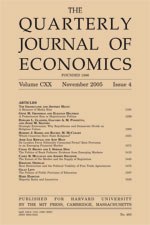
\van Wijnbergen\, S. (1984). Inflation, employment, and the Dutch disease in oil-exporting countries: a short-run disequilibrium analysis Quarterly Journal of Economics, 99(2):233--250.
-
Affiliated author
-
Publication year1984
-
JournalQuarterly Journal of Economics
Explains nontraded goods and labour shortages in the Gulf countries, the decline of the traded goods sector in oil producers ('Dutch disease'), and the absence of employment benefits of higher oil revenues in Latin American oil producers using a disequilibrium model where real wages and the real exchange rate adjust slowly to clear the labour and nontraded goods market. The slope of the wage indexation line determines whether classical unemployment or repressed inflation results. Various policy measures are analyzed.-from Author